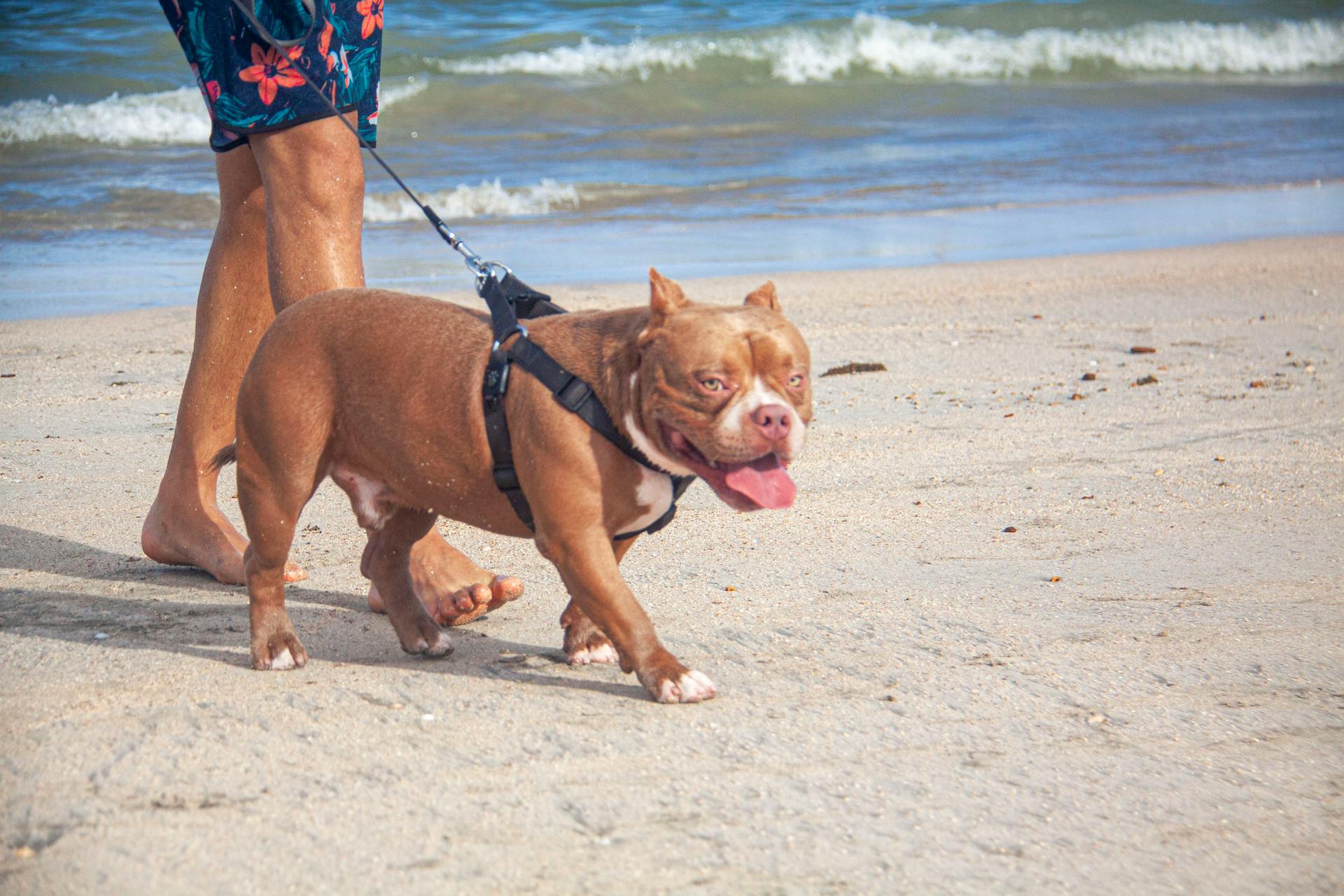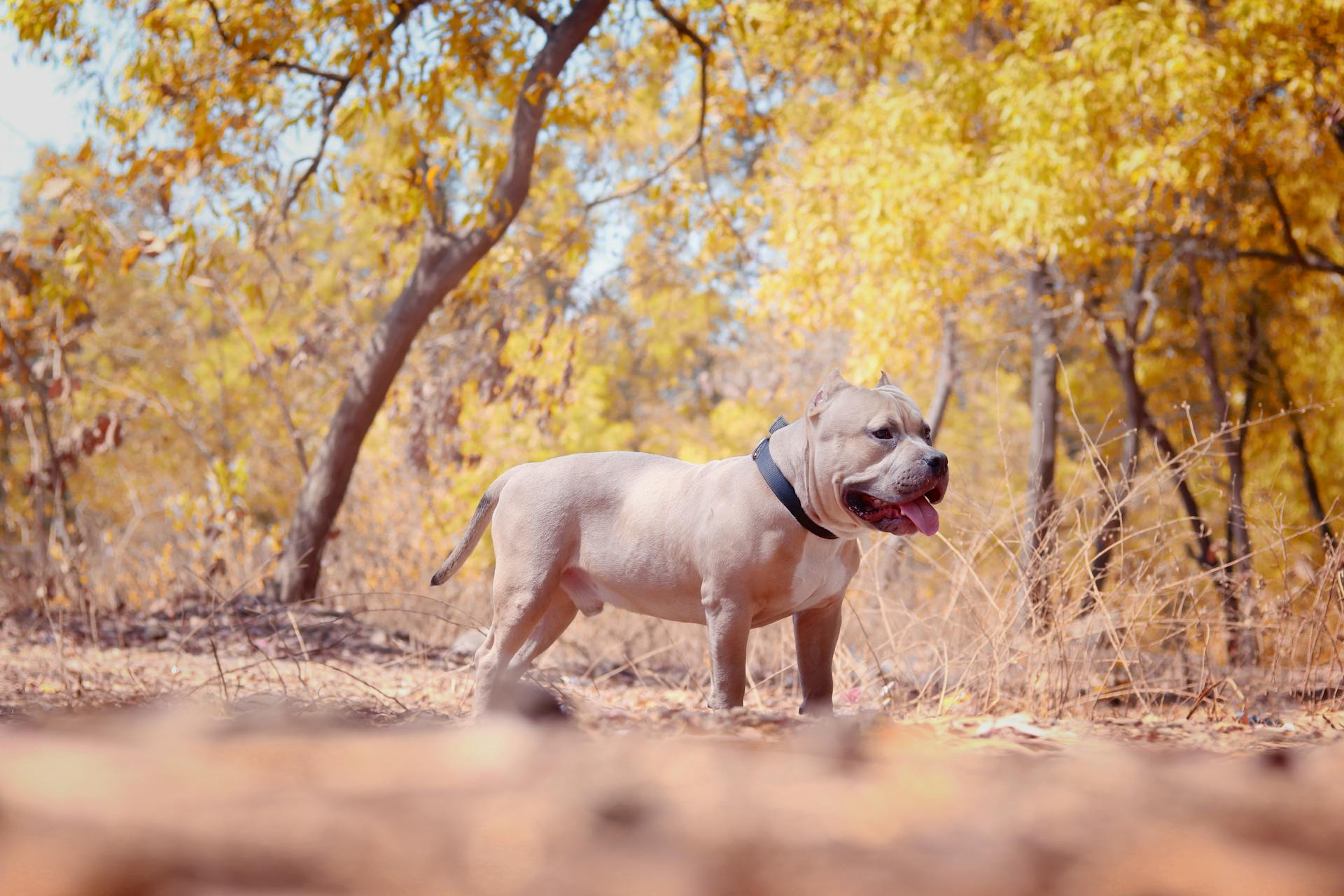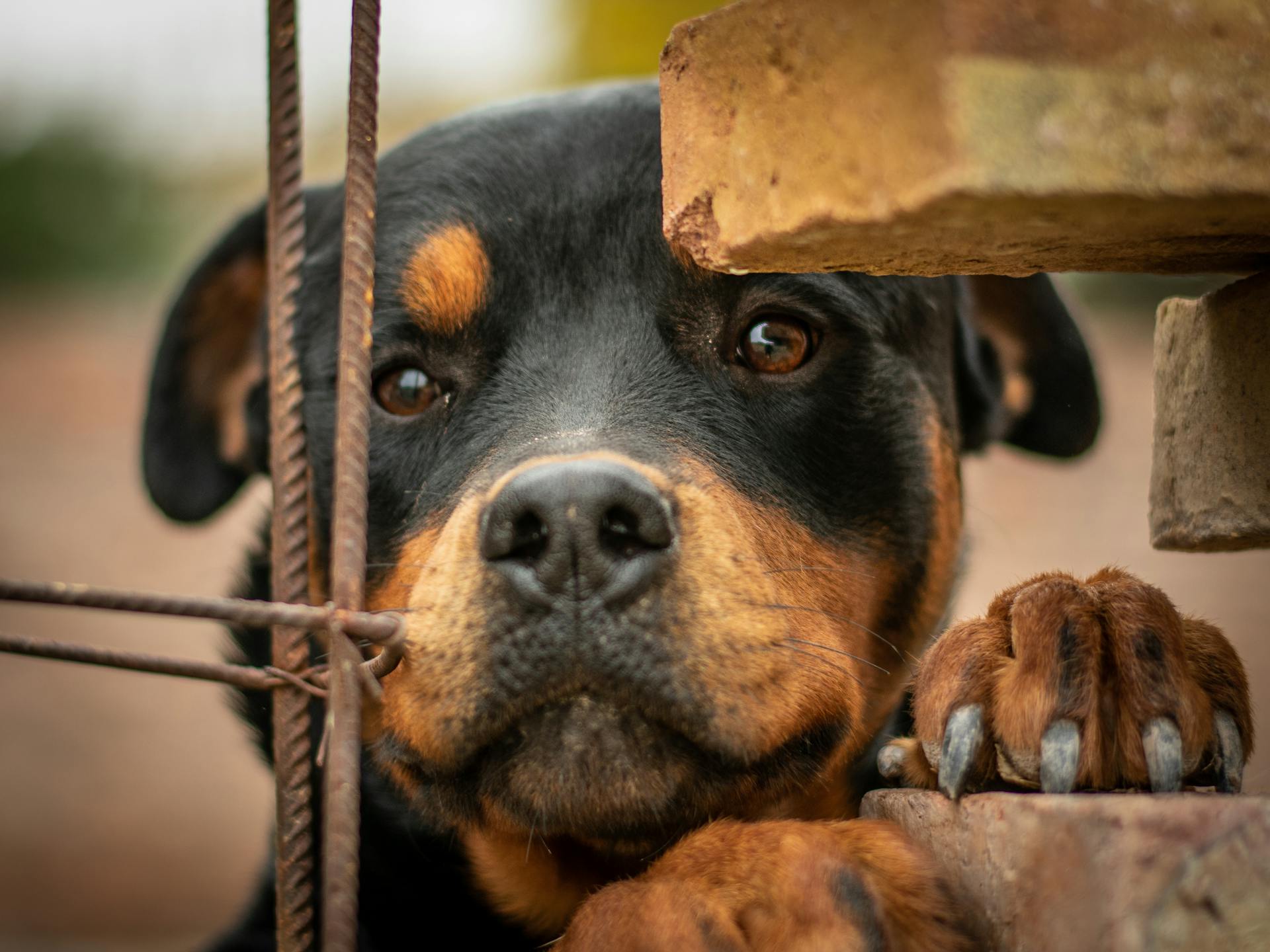
The American Boerboel is a powerful and loyal breed that originated from the South African Boerboel, which was brought to the United States in the 1980s.
They are a medium to large-sized dog, typically weighing between 110-200 pounds and standing between 23-27 inches tall at the shoulder.
Their short coats require minimal grooming, making them a great choice for busy owners.
Originating from a working breed, American Boerboels are naturally intelligent and trainable, but they can be strong-willed at times, requiring consistent training and socialization from an early age.
Explore further: Full Breed American Bulldog
History
The American Boerboel has a rich history that dates back to the 1600s when Dutch and European settlers arrived in South Africa to guard their homestead.
They brought with them mastiff-type and bulldog-type breeds that would eventually interbreed with other breeds to give rise to the modern Boerboel.
These early dogs were bred to be powerful and courageous, capable of running off lions, leopards, and baboons from their property.
They were also alert and wouldn't back down from a threat, making them ideal for guarding and protection.
The Boerboel's name comes from the Afrikaans words "boer", meaning farmer, and "boel", a shortening of "boelhond", meaning bulldog.
Breeding of the Boerboel began in the 1950s, and a breed association was established in 1983 to promote the breed.
The Boerboel gained popularity in South Africa and started to be exported around the world, but it remains fairly rare outside of South Africa.
The American Kennel Club first recognized the breed in 2015, and it still remains a relatively uncommon breed in North America.
The Boerboel's tenacity and strength are a result of its ancestry, which includes breeds such as mastiffs and bulldogs, and its ability to survive in hot weather and encounters with wildlife.
Worth a look: How to Breed American Bully
Breed Characteristics
The American Boerboel is a large and powerful breed, with males averaging 24 to 28 inches in height at the shoulder, while females tend to be between 22 and 25 inches in height.
They usually weigh between 110 and 200 pounds, though some can be larger or smaller. This size and weight make them a formidable presence, perfect for guarding and protecting their families.
One of the most distinctive features of the Boerboel is their broad head and jowly faces, typically with a black mask. Their short, dense coats come in a range of colors, from reddish-brown to cream and can be brindled (subtle tiger stripes).
Here are the key characteristics of the Boerboel's appearance:
- Ears: Medium-sized, V-shaped, and rounded at the tip, folding over and laying flat.
- Eyes: Dark brown, with an intelligent expression.
- Nose: Broad muzzle and a solid black nose.
- Coat Length: Short, smooth, dense, and shiny.
- Coat Color: Red, brown, reddish-brown, fawn, and cream, often with black coloring in the shape of a mask on their face.
- Tail: Straight, and the AKC breed standard allows for the tail to be docked or undocked.
Health and Care
The American Boerboel is a robust breed, but like all dogs, they can be prone to certain health issues. Hip dysplasia is a condition that affects the hip joints, and it's essential to be aware of this potential issue.
Regular exercise and mental stimulation are crucial for the Boerboel's physical and mental well-being. They need daily space to run around and engage in physical activity.
Their grooming needs are relatively simple, but don't let that fool you - their nails should be trimmed about once every two weeks, and their teeth should be brushed regularly. Their ears should also be checked weekly for debris and wax buildup.
Here are some potential health issues to be mindful of:
- Hip dysplasia
- Heart disease
- Eye conditions
- Vaginal hyperplasia
- Bloat
- Juvenile epilepsy
Early and consistent training and socialization are also essential for a well-mannered dog. This will help you build a strong bond with your American Boerboel.
Health

As a Boerboel owner, it's essential to be aware of the potential health issues that can affect your furry friend.
Boerboels are generally a robust and healthy breed, but like any dog, they can be prone to certain conditions. Hip dysplasia, a condition affecting the hip joints, is one such issue.
Heart disease, including various cardiac issues, can also impact Boerboels.
Regular veterinary check-ups can help identify any potential problems early on, so be sure to schedule regular appointments.
Eye conditions may impact your Boerboel's vision, so keep an eye out for any signs of eye problems.
Vaginal hyperplasia, a reproductive system disorder, and bloat, a potentially life-threatening gastrointestinal problem, are two more conditions to be mindful of.
Juvenile epilepsy, a neurological disorder, can also affect Boerboels.
To keep your Boerboel healthy, make sure they always have access to fresh water.
A quality canine diet with balanced nutrition is also essential, typically provided through two measured meals per day. Discuss the type of food and amount with your vet, as it may need to be adjusted based on factors like age, activity level, and more.
Large breed dogs like Boerboels should stay at a healthy weight to avoid putting added stress on their joints.
Care

Boerboels need regular exercise and play to stay mentally and physically stimulated.
Trim their nails about once every two weeks to prevent overgrowth.
Their teeth should be brushed regularly, as recommended by a veterinarian, to keep them clean and healthy.
Check their ears weekly for debris and wax buildup and clean them as needed to prevent infection or infestation.
Boerboels are not low maintenance, they require a lot of time spent in training and exercising.
A Boerboel's grooming needs are fairly straightforward, but they do need regular nail trimming and ear cleaning.
This large dog breed needs plenty of space to exercise every day.
Early and consistent training and socialization are essential for a well-mannered Boerboel.
Boerboels should be fed a high-quality canine diet with balanced nutrition, typically via two measured meals per day.
Always have fresh water accessible for your Boerboel.
Large breed dogs, like Boerboels, should stay at a healthy weight to avoid putting added stress on their joints.
Boerboels are prone to obesity, so be mindful of treats and other extra food.
Count all the treats you give during training and just because you love your pup.
Coat Color and Grooming
The American Boerboel's coat is a beautiful thing to behold. It's a short, straight overcoat that's smooth and shiny, covering a soft and dense undercoat.
Their coat can be a variety of colors, including red, fawn, brown, brindle, or black. Some Boerboels even have spots of white on their coat, especially around the neck, face, and paws.
These spots are considered a fault if more than 30 percent of the coat is white. Many Boerboels have dark markings around their eyes, mouths, and noses, and some have dark patches around their paws.
Their coat sheds an average amount, so regular grooming is a must. Weekly brushing and monthly baths should help keep the coat healthy and catch the shedding fur.
See what others are reading: American Staffy White
Living with a Boerboel
Living with a Boerboel can be a rewarding experience, as long as you're prepared for their unique needs. Boerboels are intelligent and can learn quickly with positive-reinforcement training methods.
A key aspect of training is consistency, as Boerboels can be stubborn and independent. They require regular exposure to new people, dogs, and locations to help mute their protective instinct.
Having a Boerboel means you'll need to be patient and understanding of their wariness around strangers, which may never completely go away.
Other Pets
Living with a Boerboel can be a wonderful experience, especially if you have other pets in the household. Boerboels do well with animals they've been raised with and live in the same household.
However, they can be quite territorial and standoffish with unfamiliar dogs. Early socialization can help keep the breed's confrontational instincts in check.
Boerboels can become competitive and aggressive with other Boerboels of the same sex. This is something to consider if you're thinking of getting another Boerboel as a companion.
It's essential to supervise playtime between your Boerboel and other pets to avoid any incidents. This will help ensure a harmonious household.
Training
Training a Boerboel is a crucial part of their development, and it starts from a young age.
Start socializing your Boerboel puppy while they’re young to get them used to meeting new people and dogs and be OK with new situations as they grow up.
Enrolling them in puppy preschool as early as 8-10 weeks old is a great idea, where they’ll learn to play nicely with other puppies and meet new people.
These early socialization experiences can help mute their protective instinct, making them less wary of strangers.
Boerboels need consistency in training, using the same commands often and not giving them (or yourself) any “days off” or free days when the rules don’t apply.
They’ll look to you for guidance, and if you don’t provide it, they’ll fill the leadership vacuum themselves.
Positive reinforcement training methods, such as treats and praise, work well for this intelligent breed, which typically learns quickly.
Be prepared to be consistent and patient, as they can be stubborn and independent at times.
Broaden your view: How to Train an American Bully
Frequently Asked Questions
What two breeds make a Boerboel?
The Boerboel is a cross between a mastiff and a bulldog. This unique heritage makes the Boerboel a versatile and powerful breed.
Are Boerboels legal in the US?
Yes, Boerboels are generally legal in the US, but importation from countries with active rabies, such as South Africa, may be restricted. Check with the US Department of Agriculture for specific import regulations.
Is a Boerboel stronger than a pitbull?
Yes, Boerboels are significantly stronger than Pitbulls, with a bite force 3.5 times greater and a substantial weight advantage. Their impressive strength and agility make them a formidable breed.
Featured Images: pexels.com


